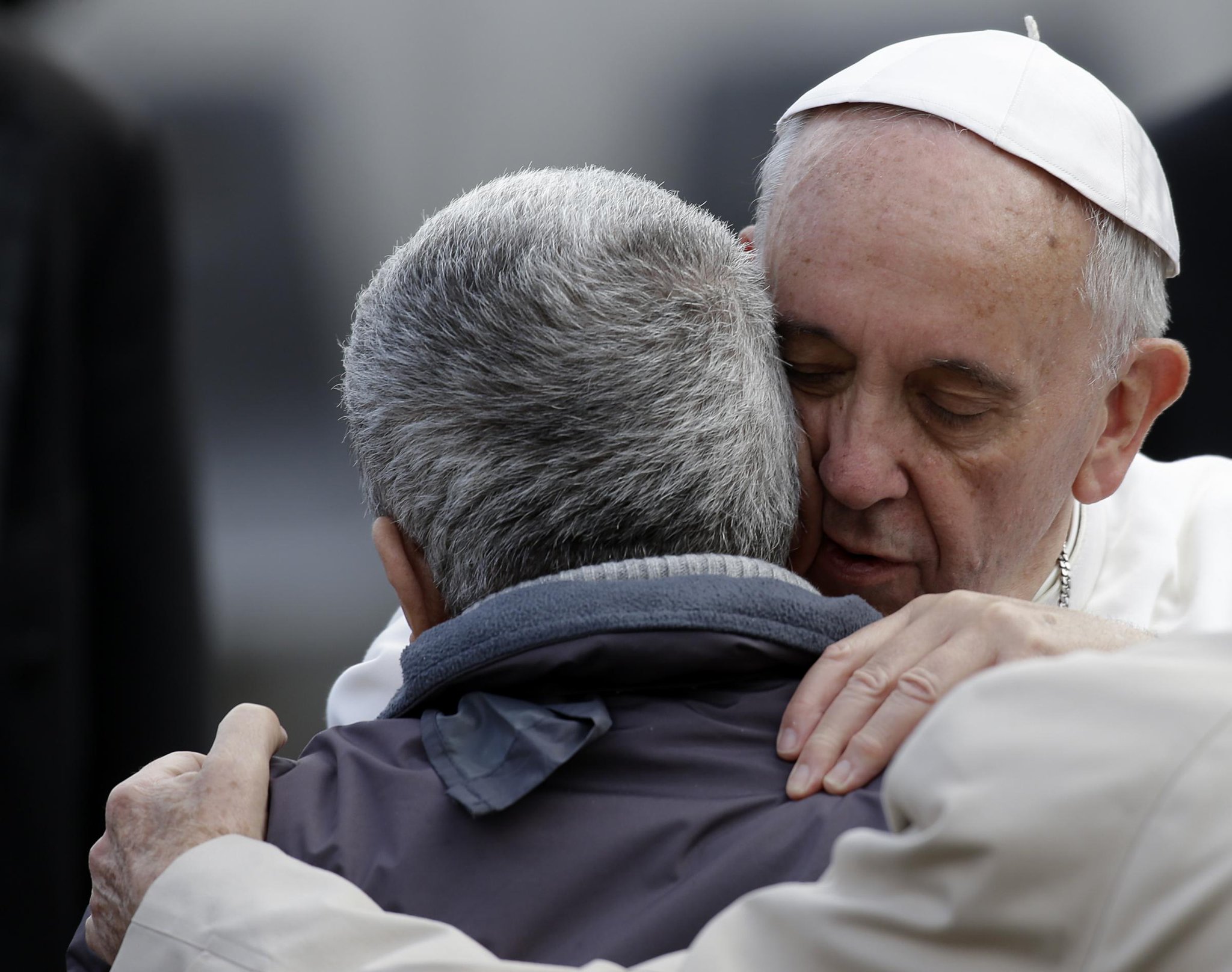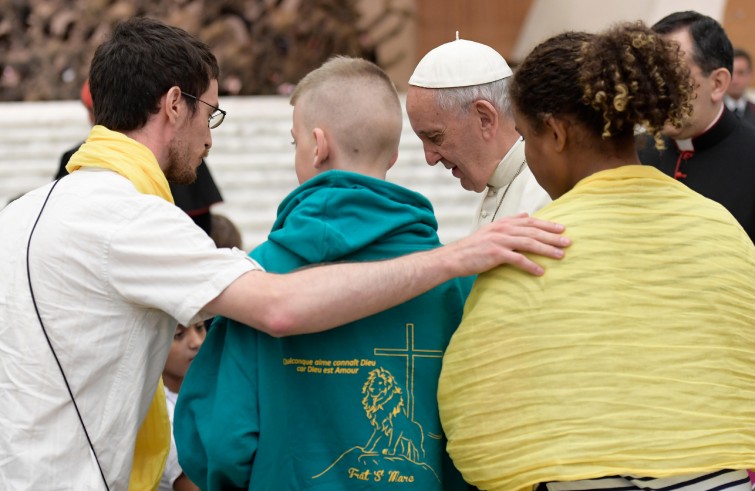Mercy
The poor represent “Christ’s flesh”, sacrament of his crucified body, to be recognized not only in the Eucharistic species displayed on the altar and kept in the tabernacle, but also in those places where they are prostrated, on the edge of the streets, in the remotest peripheries, in the deepest recesses of history. Only in this way the silk of liturgical vestments – as John Chrysostom preached – will not constitute an offense to Christ’s nudity, present among us through the poor. Only in this way will we respond to Christ’s invitation to those listening to the parable of the Good Samaritan: “Go and do likewise.” Only in this way will we experience the truth proclaimed by the Pope, when he says that the poor “are not a problem” but “a resource from which to draw and to practise in our lives the essence of the Gospel”

“Now all we need is the World Day of the fools and we will have finally given them too the opportunity of being blessed”: a few days ago I heard a person commenting out loud the initiative of the World Day of the Poor, celebrated Sunday, November 19, in such terms. The person speaking in those terms shouldn’t have done so for many reasons. First of all because he is a human being. Secondly, because he is marked by baptism and thus is a member of the community of Christ’s disciples, where, inter alia, he performs a special ministry, and thus lives in the condition of service – so as to say. Ultimately because he used this expression while sitting around a lavishly set table, with a satisfied, happy look.

Why devote so much room to this toper – whose name I shall not mention, but whom I am not making up – who takes the poor for fools, as well as the servants of peace and the other recipients of the promises of beatitude made by Jesus? To him, and to those like him, Pope Francis offers yet another possibility to understand the authentic meaning of the World Day of the Poor in the message in which he invites everyone to be prepared to celebrate it in full, making every effort “to create moments of encounter and friendship, solidarity and concrete assistance” towards whoever is afflicted by any form of poverty: from the poverty that forces to skip meals almost every day to the poverty that is made of torn and dirty clothes, that wears ragged shoes and sleeps under bridges and in paperboard makeshift shelters. It’s the poverty that can’t afford medicines to treat a disease, or a train ticket to visit family members, or a bunch of flowers to place on the tomb of his dear ones. Not to mention the merciless poverty that degenerates into loneliness and exclusion, in disappointment and desperation, in violence and anger, that leads to the brink of suicide. Or the one that fails to recognize the right to go to school, to learn the right words to ask for help or reaffirm his rights, that enables to enjoy “the other bread” without which mankind cannot live.
The World Day of the Poor, Francis says, is meant to extend the proclamation of mercy that reverberated during the latest Extraordinary Jubilee, a reminder of “Jesus’ preferential love for the poor.”
From this perspective it has first of all a hermeneutic role: established for the Thirtieth Sunday in Ordinary Time, acting as the ground for the solemnity of Christ the King, on the last Sunday of the liturgical year, to convey the deepest meaning of the paradoxical lordship of Jesus: “The kingship of Christ is most evident on Golgotha, when the Innocent One, nailed to the cross, poor, naked and stripped of everything, incarnates and reveals the fullness of God’s love.” Furthermore, it’s the propitious occasion to focus on the social implications of mercy in our contemporary world, already advanced by Francis in the Apostolic Letter Misericordia et misera.

The Pope’s message gives answers even to those who criticized him in recent years with regard to the crucial question of poverty. According to these critics, the present pontifical magisterium is entangled in the contradiction between theological-spiritual categories that identify Jesus Christ as the exemplary poor man, to be taken as our role model, and the sociological ones, whereby poverty is always an enemy to be defeated and as a negative element we must get rid of. This garbled bundle allegedly leads to what some define as Francis’ naïve Thid-Worldism, theologically weak and doctrinally uncertain.
It should be acknowledged that these criticisms fail to grasp the polarity of Francis’ thought, supported by a frame of reference that includes thinkers such as Alberto Methol Ferré, Gaston Fessard and Romano Guardini, as explained in his recent biography written by Massimo Borghesi: it is necessary to identify the fundamental coincidentia oppositorum, from which the Pope’s vision draws inspiration, to understand that following the poverty of Christ and combating poverty are – for the Christian faithful – the very same thing.
In this respect, the Message for the First World Day of the Poor is a veritable compendium of the Pope’s theology of poverty.
Its strength is rooted in the Biblical message and in the great ecclesial tradition: this can be seen in the reference to the Psalms, in the exhortation to love not in words but with deeds found in the First Epistle of John and in the Epistle of James, in the re-evocation of solidarity of the early Church illustrated in the Acts of the Apostles, in the echo of the sermon on the Mount and in the Christological Hymn in the second chapter of the Epistle to the Philippians, as well as in the teachings of John Chrysostom on the sacramental nature of the poor man, in the reference to the example of Francis of Assisi, to the lesson of Vatican II and to the Catechism of the Catholic Church.
From such articulated framework emerges the vocational profile of poverty, understood as a call “to follow Jesus in his own poverty”: “Poverty is an interior attitude that avoids looking upon money, career and luxury as our goal in life and the condition for our happiness […], it is the yardstick that allows us to judge how best to use material goods and to build relationships that are neither selfish nor possessive.”
The spiritual afflatus of this theology of poverty is clearly perceivable, which is neither abstract nor emotionally idealistic..
The theology of poverty, underlying the World Day of the Poor, is extremely concrete: the poor, more than poverty, constitute its central theme.
While on the one side we should not forget that poverty “is born of social injustice, moral degeneration, the greed of a chosen few, and generalized indifference”, on the other – Francis states – we cannot ignore that “in myriad ways poverty challenges us daily, in faces marked by suffering, marginalization, oppression, violence, torture and imprisonment, war, deprivation of freedom and dignity, ignorance and illiteracy, medical emergencies and shortage of work, trafficking and slavery, exile, extreme poverty and forced migration. Poverty has the face of women, men and children exploited by base interests, crushed by the machinations of power and money.”

“If you don’t touch him you don’t meet him”, the Pope often points out. Between the lines of the message for the World Day of the Poor reverberates the following refrain:
we must have a personal relationship with the poor, not one that was mediated or obtained by means of a philanthropic text message or through one of the many non-profit organizations.
The poor represent “the flesh of Christ”, sacrament of his crucified body, to be recognized not only in the Eucharistic species displayed on the altar and kept in the tabernacle, but also in those places where they are prostrated, on the edge of the streets, in the remotest peripheries, in the deepest recesses of history. Only in this way the silk of liturgical vestments – as John Chrysostom preached – will not constitute an offense to Christ’s nudity, present among us through the poor. Only in this way will we respond to Christ’s invitation to those listening to the parable of the Good Samaritan: “Go and do likewise.” Only in this way will we experience the truth proclaimed by the Pope, when he says that the poor “are not a problem” but “a resource from which to draw and to practise in our lives the essence of the Gospel.”